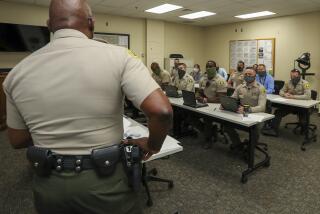Hacker Seeks a Return to State for Trial
- Share via
Computer desperado Kevin Mitnick wants to waive extradition and return to California to face trial on a multitude of hacker-related charges, according to authorities who said Thursday they have only begun to determine the nature and extent of his crimes and victims.
Mitnick was being held without bail in Raleigh, N. C., where he was arrested after eluding federal authorities for two years.
“Kevin will waive his preliminary hearing,” said Assistant U. S. Atty. David Schindler in Los Angeles. “He has said, ‘I am (your) guy, and I want to go back to California as soon as possible.’ ”
Schindler and other authorities said Mitnick will agree to forgo the legal formalities that could keep him in North Carolina for weeks because he wants to be tried in California to be closer to friends, family--and his trusted defense lawyer, John Yzurdiaga.
Yzurdiaga had no comment on any part of the Mitnick case.
Authorities were still uncertain of Mitnick’s motives in becoming the nation’s most wanted computer hacker.
“It is something we will be looking at--why has he done this?” Schindler said. “Everyone wants that answer, but only Kevin Mitnick knows that. We will be looking at anything and everything.”
After an intensive electronic and computer dragnet, Mitnick was arrested about 1:30 a.m. Wednesday as he talked on the phone in an apartment near Raleigh that he was renting under an assumed name.
Although federal authorities declined to discuss what they had found in Mitnick’s sparsely furnished apartment in the Players Club complex, Assistant U. S. Atty. John Bowler in Raleigh said authorities found material that would be helpful to their investigations, though he didn’t specify what it is.
Bowler refused to comment on statements by other authorities suggesting that investigations are pointing to potential Mitnick accomplices or conspirators who helped him evade prosecution while he allegedly continued his criminal activities.
As authorities moved to consolidate and coordinate their cases against Mitnick on Thursday, more details became available regarding his capture, how his activities have affected national computer networks, and his two solitary years as a fugitive. Among them:
* One suspected Mitnick victim was New York Times writer John Markoff, according to a sworn statement filed by an FBI agent on file in Raleigh. Markoff has written extensively about computer hackers, including Mitnick, and on Jan. 23 published a story about a break-in at a San Diego computer lab that is believed to be Mitnick’s work.
At the time, Markoff’s computer in San Francisco had already been broken into, though he did not realize it, said Nancy Nielsen, spokeswoman for the newspaper.
“Markoff had two accounts that were broken into, both commercial on-line services, and neither one had any information on them that were of any importance,” Nielsen said. “John Markoff knew not to put important information on any commercial on-line service.”
The New York Times editorial computer system “is completely secure. Nothing in New York has been touched. We monitor our security regularly,” Nielsen said.
About Jan. 23, Nielsen said, “we began to monitor our security gates even more closely at the New York Times.”
* The Mitnick case shows that the computer security community is going to have to move toward encryption of the Internet, according to Sid Karrin, director of the San Diego Supercomputer Center, whose personnel were cited by authorities for helping track the fugitive.
“It means that eventually we are going to have to implement strong encryption, that is, to encipher all the data so it can’t be used by anyone who picks it up,” Karrin said. “That is not the case today on the Internet, and it will have to be the case in the future.”
“Another message is that it’s commercially important. We’re trying to develop this nation-global information infrastructure. It’s important that the data be secure, private, on those networks,” Karrin said.
* Schindler said federal authorities in Los Angeles, San Francisco, San Diego, Colorado and other jurisdictions all have been investigating Mitnick for alleged computer break-ins in their areas, and that “the nature of his (computer hacking) intrusions are substantial.”
The FBI affidavit filed in the case alleged that Mitnick used his hacking prowess to steal files through the Internet, including cellular phone software developed under a grant from the National Security Agency worth between $500,000 and $1 million. In all, according to documents and interviews, Mitnick is suspected of stealing tens of thousands of personal credit card numbers as well.
* Some law enforcement sources and private investigators who also have tracked Mitnick in recent months in Seattle and other areas said they have no reason to believe he cracked computer systems for his own financial gain, even if he did download files and other proprietary information.
They said the one-time overweight, only child who grew up in the San Fernando Valley lived a Spartan and solitary life, going to and from work by public transportation, eating at Taco Bell and spending most of his hours by himself in front of a computer keyboard.
“He was not living the life of a high-roller,” said Deputy U. S. Marshal Kathy Cunningham in Los Angeles, who has been tracking Mitnick. “With all his talent, all he has to show for it is a criminal record and a reputation. It’s pretty sad.”
Other authorities said it is too early to determine whether Mitnick profited from his alleged crimes, especially since he used so many aliases during his years as a fugitive.
While authorities press ahead with their investigations, armed with whatever they seized at Mitnick’s rented apartment, Schindler cautioned it may be months, if not longer, before anyone can say with certainty why Mitnick hacked, who his victims are and other details.
More to Read
Sign up for Essential California
The most important California stories and recommendations in your inbox every morning.
You may occasionally receive promotional content from the Los Angeles Times.













